|
|
|
Sort Order |
|
|
|
Items / Page
|
|
|
|
|
|
|
| Srl | Item |
| 1 |
ID:
110652


|
|
|
|
|
| Publication |
2011.
|
| Summary/Abstract |
As we write, the world is still in the grips of a financial crisis. Germany was one of the first countries to bail out a bank in July 2007. Then, in September 2007, the United Kingdom (UK) witnessed a run on a building society, Northern Rock, and the subsequent widespread nationalization of its banking sector. In the United States, the crisis led to a number of collapses among financial institutions, most famously Bear Stearns and Lehman Brothers, and the bail out of the insurance group, AIG, all in 2008.
|
|
|
|
|
|
|
|
|
|
|
|
|
|
|
|
| 2 |
ID:
132573
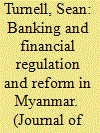

|
|
|
|
|
| Publication |
2014.
|
| Summary/Abstract |
For fifty years Myanmar has been without a properly functioning financial system. This absence has been a significant brake on the efficacy of reform in Myanmar, on foreign investment, and on the ability of Myanmar firms to raise the capital they need to grow and prosper. Since 2011, however, critical but limited reforms have been put in place by Myanmar's new government. These include reforms to Myanmar's exchange rate arrangements, and the granting of a degree of formal autonomy to the country's central bank. Other reforms, pending but not yet implemented, include allowing a role for foreign banks, and making changes to the broader regulatory arrangements that currently greatly constrain the operations of Myanmar's banks. In recent times much progress has been made in creating the financial institutions Myanmar needs to achieve transformational growth, but much remains to be done.
|
|
|
|
|
|
|
|
|
|
|
|
|
|
|
|
| 3 |
ID:
154451
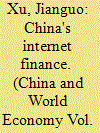

|
|
|
|
|
| Summary/Abstract |
China's Internet finance industry developed explosively from 2012 to 2015. Undersupply of financial services, progress of information technology and accommodative regulations for Internet finance jointly explain the explosive development. Regulation tightened after the small-scale P2P lending crisis in 2015. The present paper discusses the role of information technology and mega data analysis in financial services, with particular attention paid to some popular misconceptions. The paper predicts that large financial institutions and information technology companies will play a dominant role in the future development of Internet finance.
|
|
|
|
|
|
|
|
|
|
|
|
|
|
|
|
| 4 |
ID:
133810
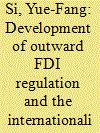

|
|
|
|
|
| Publication |
2014.
|
| Summary/Abstract |
The Investment Development Path (IDP) model has been widely accepted for illustrating the relationship between the inward and outward foreign direct investment (FDI) positions of a country and its economic status based on the data from developed economies. In recent years, however, outward FDI from developing economies has increased dramatically and it has been argued that institutions are 'forefront' factors in addition to the economic index. In this article, we use statistical data from China, which has gone through dramatic regulation reform and FDI development, to test the validity of the IDP model. We also trace the history of Chinese FDI regulation development to answer the following question: in what way are regulations important for FDI in different periods? We use Lenovo as a case study to show how a Chinese firm 'avoids' and 'adapts to' regulation changes. We find that the FDI development of China still follows the IDP model; however, the Chinese government has accelerated the whole process through active regulation reform. In a transition economy such as China, FDI co-evolves with the regulation, and the firms which can influence or foresee the policy changes can prosper considerably.
|
|
|
|
|
|
|
|
|
|
|
|
|
|
|
|
| 5 |
ID:
107988


|
|
|
|
|
| Publication |
2011.
|
| Summary/Abstract |
The current financial crisis demonstrated, once again, the need for deep reforms of the international monetary and financial architecture. This article argues that reforms under way are insufficient, as they are partial in scope and rely excessively on an ad hoc body, the G20. It thus calls for an international architecture that meets two basic criteria. First, it should be comprehensive. This means that a broad range of reforms should be undertaken: better macroeconomic policy coordination; regulatory reform, including cross-border capital flows; ample countercyclical IMF and development financing with limited conditionality; global monetary reform; and the creation of an international debt court. Second, inclusive institutions should stand at the center of the new architecture, structured as a multilayered network of global, regional, and national financial institutions.
|
|
|
|
|
|
|
|
|
|
|
|
|
|
|
|
| 6 |
ID:
094726
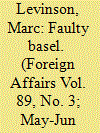

|
|
|
|
|
| Publication |
2010.
|
| Summary/Abstract |
Attempting to prevent future financial crises by drafting new global regulations will do more harm than good. If governments adopt the same regulations, they will make the same mistakes. Instead, financial regulation must be the task of individual governments and not multilateral committees.
|
|
|
|
|
|
|
|
|
|
|
|
|
|
|
|
| 7 |
ID:
145553
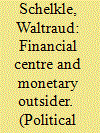

|
|
|
|
|
| Summary/Abstract |
The UK's negotiating position in the area of ‘economic governance’ started from the assumption that there is a deep dividing line between insiders and outsiders of the ‘euro zone’. To protect the outsiders, the UK government did not ask for a veto, but for a safeguard mechanism that can postpone a decision in the euro area. This is exactly what David Cameron achieved in the negotiations with Council President Tusk. This article explains why the UK demands were so modest. Key is the peculiar situation of the UK being the major financial centre for a currency union to which it does not belong. Hence, the UK taxpayer needs protection from the City, and EU membership has helped to provide this. There is not much else a UK government could ask for.
|
|
|
|
|
|
|
|
|
|
|
|
|
|
|
|
| 8 |
ID:
107990


|
|
|
|
|
| Publication |
2011.
|
| Summary/Abstract |
Throughout the history of capitalism, there have been tensions between financial institutions and the state, and between financial capital and the firms and households engaged in the production and consumption of physical goods and services. Periods of financial sector dominance have regularly ended in spectacular panics and crashes, often resulting in the liquidation of large numbers of financial institutions and the reimposition of regulatory controls previously dismissed as outmoded and unnecessary. The aim of this article is to consider measures to restore financial markets to their proper role, as servants rather than masters of the market economy and the society within which it is embedded.
|
|
|
|
|
|
|
|
|
|
|
|
|
|
|
|
| 9 |
ID:
133421
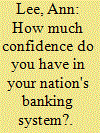

|
|
|
|
|
| Publication |
2014.
|
| Summary/Abstract |
The global banking system is the fundamental conduit of value within nations and across borders. Since the last global financial crisis, however, the role of banks as a repository of value has come increasingly into question. Today, with a fragile recovery in so much of the world, banks and those who manage and regulate them are under attack. We asked our panel of global experts how this crisis of confidence is playing out in their nation or region.
|
|
|
|
|
|
|
|
|
|
|
|
|
|
|
|
| 10 |
ID:
160538


|
|
|
|
|
| Summary/Abstract |
Indonesia’s banks and financial markets have developed considerably over the twenty years following the country’s devastating financial crisis of 1997–98. Government policy has balanced a variety of objectives involving the financial sector, such as seeking growth, financial inclusion, and stability. Recent data shows that financial stability indicators are mostly robust, suggesting a relatively resilient banking sector. Also, interventionist policies under the government of President Joko Widodo, aimed at promoting financial inclusion and growth, have so far not been excessively costly. However, a degree of inefficiency may be the price to pay for financial stability. This article explores some of the policy and structural sources of inefficiency in the banking sector as they have developed over recent years. It shows that Indonesia’s banking sector is structurally segmented, with limited competition among the largest banks and a competitive —but constrained—mid-size bank segment. Foreign takeovers of existing banks are a possibility, but that does not necessarily improve banking sector performance. Alternative sources of finance and vehicles for private saving in Indonesia may reduce the impact of the inefficiency.
|
|
|
|
|
|
|
|
|
|
|
|
|
|
|
|
| 11 |
ID:
099440


|
|
|
| 12 |
ID:
096246


|
|
|
|
|
| Publication |
2010.
|
| Summary/Abstract |
If the G's are the world's steering committee, the step from G7 to G20 deepened the democratic legitimacy of this committee. However, it also shifted influence to a group that share little else other than economic power: they have diverse experiences, challenges, cultural perspectives and starting points. This is particularly the case in the field of financial regulation, where action across these countries in recent months-despite all the language of global regulation-is increasingly local. The prospect of the new global being quite local has dismayed some. But it need not. This article challenges the dichotomy of more global versus more local. It argues that financial internationalism-greater cooperation by nations for the benefit of all-is better served by institutions that help to integrate diverse systems than those which try to enforce one-size-fits-all approach to very different economies.
International banks persuaded regulators of the benefits of home country regulation and a level playing field for bankers. But the benefits accrued largely to the banks in the boom and proved an avenue for contagion during the crash. Host country regulation may prove a safer way to regulate financial systems, in particular by allowing regulation to be more responsive to national economic conditions and cycles. It is likely that a shift back to host country regulation will act as a drag on international capital flows. The instinct of economists is that the cost of this is uncertain, suspect and conditional, especially when compared to the costs of financial crashes. Host country regulation does not mean there is no role for international institutions, such as the newly minted Financial Stability Board. Instead, it suggests a more nuanced role, potentially encompassing the policing of international market infrastructure, financial protectionism, information free flow between regulators and the convergence of regulatory principles and the consolidation of regulatory instruments. An informed and collegiate process of integrating different financial systems will be a more resilient system than one which tries to apply a single rule book across inherently different countries.
|
|
|
|
|
|
|
|
|
|
|
|
|
|
|
|
| 13 |
ID:
047154


|
|
|
|
|
| Publication |
London, Zed Books Ltd., 2001.
|
| Description |
xlii, 321p.
|
| Standard Number |
1842770225
|
|
|
|
|
|
|
|
|
|
|
|
Copies: C:1/I:0,R:0,Q:0
Circulation
| Accession# | Call# | Current Location | Status | Policy | Location |
| 044622 | 330.9595/JOM 044622 | Main | On Shelf | General | |
|
|
|
|
| 14 |
ID:
108316


|
|
|
|
|
| Publication |
2011.
|
| Summary/Abstract |
This article examines Ireland's financial crisis. Thus far explanation has focused on individual or collective administrative failure: the office(r) of financial regulation singularly failed to scrutinise the banks sufficiently: it was a matter of poor risk management. While this article would agree that the (mis)management of risk was important to how the crisis unfolded, I argue that an explanation of why the crisis emerged demands an altogether different focus. Put simply, after financial regulatory reform, a reconfiguration of risk in politics took place as the locus of decision-making about financial risk shifted from the realm of the political/legal (Cabinet/Central Bank/Department of Finance) to the economic/legal (retail banks, shareholders/consumers). It was a critical development, one that mirrored events taking place in the UK, upon which Ireland drew experience, for now assessments about risk undertaken by the banks demanded that intervention could be justified only on an ascertainable risk, not a theoretical uncertainty (or spurious fear). The evidentiary bar for intervention was therefore raised, removing the precautionary instinct implicit in the prudential governance of Central Banks.
|
|
|
|
|
|
|
|
|
|
|
|
|
|
|
|
| 15 |
ID:
157682


|
|
|
|
|
| Summary/Abstract |
Driven by advances in data analytics, machine learning, and smart devices, financial technology is changing the way Canadians interact with the financial sector. The evolving landscape is further influenced by cryptocurrencies: non-fiat, decentralized digital payment systems, like Bitcoin, that operate outside the formal financial sector. While Bitcoin has garnered attention for facilitating criminal activity, including money laundering, terrorism financing, digital ransomware, weapons trafficking, and tax evasion, it is Bitcoin's underlying protocol, the blockchain, that represents an innovation capable of transforming financial services and challenging existing security, financial, and public safety regulations and policies. Canada's challenge is to find the right balance between oversight and innovation. Our paper examines these competing interests: we provide an overview of blockchain technologies, illustrate their potential in Canada and abroad, and examine the government's role in fostering innovation while concurrently bolstering regulations, maintaining public safety, and securing the integrity of financial systems.
|
|
|
|
|
|
|
|
|
|
|
|
|
|
|
|
|
|
|
|
|